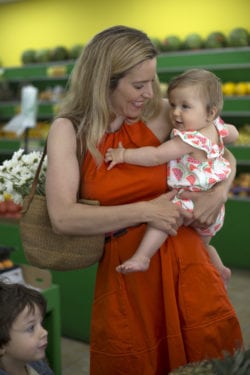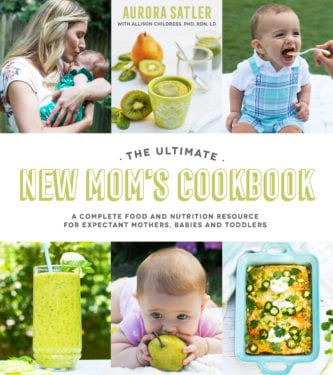What should I make for dinner? That’s a question all of us moms ask. Every night, sometimes. That’s why we were really excited for Aurora Satler’s The Ultimate New Mom’s Cookbook, a recent NAPPA winner. Helping parents gain knowledge about prenatal nutrition while creating delicious and nutritious recipes for babies, kids and adults are just a few of the reasons we love this cookbook. With help from certified nutritionist Allison Childress, Satler was able to create both an informative and creative book of recipes. We recently chatted with Satler about the challenges of being a new mom and the simplicities of creating delicious meals for her family.
Get a first look inside Satler’s new book with these two incredible recipes: Click HERE

Aurora Satler and her family
What was your biggest inspiration for writing this cookbook?
There is so much information to be absorbed as a first time parent. When I had my son, I found it a little daunting to suddenly have to be up-to-date on all the best baby gear, sleep techniques, developmental milestones, not to mention nutrition. I wanted to create one book for new parents to answer all their food questions, offer great recipes that work for the whole family and keep all the key information so that it was readable at a glance. I also wanted the book to be enjoyable and reminiscent of the spirit of childhood. That’s why all the colors are bright and cheerful and the copy brief and humorous whenever I could manage. Parenting is a challenge – this book should be a helpful and fun resource.
If new parents don’t enjoy cooking but want to feed their children home cooked meals, what advice would you give to inspire them to cook?

Aurora with her daughter and husband
You really don’t have to cook every meal and it shouldn’t be a chore. A family meal is the way to go and dinner is usually the best one to strive for in our moving society. I actually set the portions of my meals so that cooking dinner also provides enough leftovers for lunch the next day. You need to maximize your time as a parent so aim for meals that go further to feed the family.
Parents with multiple children can have trouble satisfying everyone’s tastes. What are some of your best tips for cooking for the whole family?
Everyone has different tastes but I’ve learned to separate a lot of meals into their component parts. This works well for different ages and different kids. My son prefers to be fed and my baby daughter wants to do it all herself. She’s more adventurous for different textures, ingredients and flavors. My son likes to watch what everyone is eating and decide what he will try and what he maybe wants to look at but not eat immediately.
For example: if I make chicken enchiladas, I can serve my husband and myself the full enchiladas. For my daughter I can pick out some of the cooked chicken and rice and avocado as finger food. For my son, I ask if he wants to eat the enchilada or if he wants a burrito bowl where I would serve him the rice and chicken with mashed up avocado that he can easily eat with a spoon. Even if my son is in a picky mood, all the cooked components are things I can offer him for his dinner. I also always give him one meal component he loves so he wants to sit down to eat, even if it is just dried cranberries or a special yogurt cup. He sees that one thing he loves at his place and will start eating. At that point, I know I can entice him to eat a more complete meal.
When did you realize you had a passion for cooking?

Aurora and her kids at the supermarket
My family has always loved food. I grew up in the Pacific Northwest where my Grandma grew the best raspberries and sugar snap peas and my parents took me crabbing and clamming as soon as I could toddle along. We ate the freshest meals: grilled salmon that my uncle had caught on the beach, pies my grandmother baked with her own apples and all the millions of meals my mom created to expand my tastes into other nationalities and flavors.
Once children start attending school, meals on the go become staples for many households. How do you meal prep to make sure your children are eating nutritious and delicious food when mealtime is away from home?
For kids eating away from home, I think it is really important to make meals accessible. Meals on the go and meals at school should be easy to eat and not messy. Finger foods or simple food to spear are perfect and there are so many nutritious options. I also try to pack more meals that are good cold or served room temperature since not all schools have the ability to rewarm food. That doesn’t mean food has to be bland. You can pack smoothies, you can pack pasta salads with veggies, fun dips, etc. Just give it a trial run at home and make sure you’re packing in an easy to use container. Kid bento boxes are a good choice.
Growing up, what were some of your favorite family recipes or traditions?
I love food holidays. Thanksgiving will always be a favorite for me and even when my son was born a week before the holiday, I mapped out my meal to lay out an entire spread to host my family after his birth. Okay- not expecting anyone else to do that but that made me feel happy that year. Communal meals give so much more than nourishment, they bring happiness and a sense of family and togetherness. We always had family picnics and birthdays and holidays growing up. I want that for my kids. I want them to be able to have not only a full plate but a full circle of support as they go through life’s ups and downs. Food at its best brings people together.

Aurora and her husband
As a busy parent with a passion for your family and your career, you probably know that despite your love to cook, life can sometimes get in the way. What tips do you have for situations where parents don’t have the time to cook?
Keep a stocked pantry and freezer. Every parent runs into busy stretches. I often roast trays of vegetables and freeze the extras. A good toaster oven is perfect for warming small portions. In a stocked pantry, you can keep gnocchi, fresh pasta, beans, rice and so many components of fast and family friendly meals. Stocking a pantry is also great before you go on a family trip. That way when you return you always have something to eat with minimal effort and no grocery trip.
I also think meal prep is important for all families. In my book I try to offer examples of things that take the same amount of time to cook so that if you have an oven going you can make 2-3 easy dishes in the same amount of time. It is about maximizing the results and minimizing the time.
Families sometimes follow gluten free, vegetarian, or vegan lifestyles. How can parents effectively create nutritionally complete meals for their families using these lifestyles as guidelines?
I offer a lot of these options in the book. I find most families who follow these lifestyles get creative themselves and the food industry is responding well to meet these various nutritional needs. One category of food that I feel meets most of these needs however are curries. Using rice as the base and creating a broth rich in coconut milk and stock, you can add in nut butters for protein and a myriad of vegetables. The best is that they are also one pot meals that taste better over time and are perfectly adaptable for families. The coconut milk is also a real hit with a lot of kids and you can spice according to your family’s preferences.

New parents often suffer from a lack of sleep and exhaustion. What gave you motivation to keep cooking when you were in these situations?
I don’t sleep. It’s a laugh but I always tell my friends if you ever see me come out with a book on sleep techniques that I’ve gone off the deep end and not to buy it. My kids eat great but I’ll be the last to advise on sleep. I cook because it makes me feel better, it gives me energy and good food begets sleep (even if you can’t enjoy it yourself). When you have kids you see that everything is cyclical–a good meal often results in a good nap which then can lead to a good meal and so on. When something falls off–you have to work from all angles to get back to a better schedule. When you eat well, you feel better and your body can perform more optimally. You also just feel better when you eat well and are eating more nutritious food. As a little hack, I make my lunches the night in advance. That way even if breakfast is a moving target, I’ve set myself up for a great meal in the middle of the day to keep me going.
As your children grow older, what steps do you want to take to inspire them to eat healthfully and even learn to cook by joining you in the kitchen?

Aurora’s two children
My son grocery shops with me and I answer all his questions (he’s 3 so he asks a LOT of questions). I also let him pick off my plate even if I know he won’t eat something. I encourage him to try new foods and he has a complete toy set to cook with me from his own knife, cutting board, as well as fruits and vegetables he can cut in half with his play knife (these are blunt toys).
When there’s something he can help with that is safe I always let him: mixing batter, spinning salad, pushing the buttons on the blender to mix a smoothie. He’s been the inspiration for this cookbook and when I told him about this award he told me “It’s my award mommy, not yours”… he might be a little competitive.
What advice would you give to parents whose children are picky eaters?
Keep trying. Most kids aren’t picky 100% of the time and will go in phases where they are more experimental. Even if they don’t finish something nutritious, have them try it. Have them try it frequently. Don’t try to make it into a battle but also let them see you eating a full and varied diet as well.
What are your most valuable takeaways from working with a nutritionist on your book?
Allison was incredible to work with and such an asset for the book. We both are moms and both work with food but see a plate in a different way. I see flavors and ingredients I want to share with my kids and she sees nutrition building blocks to raise a healthy family. She was exceptional as well because she also has a background in prenatal nutrition which is a key component of this book.

The Ultimate New Mom’s Cookbook Cover
